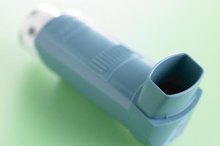Side Effects of Nebulizer Use
People with chronic lung conditions, such as asthma or emphysema, may use a nebulizer -- a machine that turns liquid medicine into mist 2. During a treatment, the mist is inhaled through a face mask or mouthpiece for a span of about 10 to 15 minutes. Nebulized medicines are often used to help improve airflow. The medications and not the nebulizer are responsible for most side effects. However, some problems are specific to nebulization. Drug side effects are possible, regardless of the delivery method, and may range from mild to severe.
If you are experiencing serious medical symptoms, seek emergency treatment immediately.
Possible Side Effects of Nebulizer Use
Otherwise, side effects are typically from the medicine itself. Beta-agonists, such as:
- headache
- insomnia
- rapid heartbeat
- tremor
- nervousness
These often go away within a few minutes or after a few doses. Another group of bronchodilators, anticholinergics, may cause dry mouth or cough. If they get into the eyes, the may worsen glaucoma or cause eye irritation. Inhaled corticosteroids, sometimes combined with other medicines, help to reduce swelling in the airways. These tend to cause local effects like sore throat, hoarseness and thrush, a yeast infection in the mouth. Corticosteroids may help with inflammation, but this effect may also increase the risk of infection in some circumstances.
- Otherwise, side effects are typically from the medicine itself.
- These tend to cause local effects like sore throat, hoarseness and thrush, a yeast infection in the mouth.
Potentially Serious Side Effects
Ingredients in an Asthma Inhaler
Learn More
Drug interactions are possible. For example, beta blockers -- prescribed for heart conditions -- need to be used with caution with the beta-agonists prescribed for lung conditions, because they can reduce the effects of your medicine, worsening your breathing symptoms. Skin rash and difficulty breathing may be signs of a serious drug allergy. Fever, chills, difficulty breathing and coughing may be signs of an infection, but some of these symptoms, like worsening breathing, can be caused by the medication itself.cause:
- Fever
- chills
- difficulty breathing
- coughing may be signs of an infection
- but some of these symptoms
- like worsening breathing
- can be caused by the medication itself
- Drug interactions are possible.
- Skin rash and difficulty breathing may be signs of a serious drug allergy.
How to Avoid Complications
Use your nebulizer exactly as directed and clean your nebulizer regularly to get the right amount of medicine and prevent infection. To avoid interactions with other medicines and supplements, make sure you review everything you are taking and any allergies you have with your doctor so she can prescribe the safest options for you. Some medications are not appropriate if you are pregnant, planning to become pregnant or nursing.
When to Contact Your Doctor
List of Nebulizer Medications and Ingredients
Learn More
Call your nurse or doctor to receive more training if you are having trouble using a nebulizer. Your doctor can also provide medical advice if you experience any side effects related to your medicine. For more serious symptoms such as chest pain, irregular heartbeat or sudden worsening of breathing symptoms, seek medical attention right away.
Related Articles
References
- American Lung Association: How to Use a Nebulizer
- American Family Physician: Adverse Drug Reactions - Types and Treatment Options
- Chest: Aerosol Therapy for Obstructive Lung Diseases Device Selection and Practice Management Issues
- European Respiratory Society Guidelines on the Use of Nebulizers
- O'callaghan C, White JA, Kantar A. Nebulization of corticosteroids to asthmatic children: large variation in dose inhaled. Respirology. 2014;19(2):276-279.
Resources
Writer Bio
Based in the Boston area, Deanna Neff has a background in public health, health policy and analytics, and a decade of experience in medical writing and editing. She works with major publishers and specializes in evidence-based patient and physician medical content. She holds a Master of Public Health from Tufts University School of Medicine.







